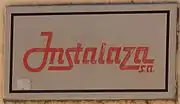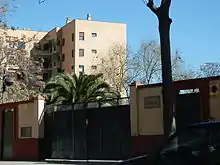 | |
| Type | S.A. |
|---|---|
| Industry | Defence |
| Founded | 1943 |
| Headquarters | , |
Area served | worldwide |
| Products | Explosives, Electro-optical devices |
| 12.4 million €[1] (2011) | |
Number of employees | 140 (2007) |
| Website | instalaza.com |
Instalaza SA is a Spanish firm that designs, develops and manufactures equipment and other military material for infantry. The company, founded in 1943, is headquartered in Zaragoza, Aragon, where its production plant is also located.

Instalaza's professional experience is widely noted as a supplier of both the Spanish armed forces and countries around the world. Instalaza has had Pedro Morenés Eulate, Secretary of State for Defence between 1996 and 2000, Secretary of State Security from 2000 to 2002, Secretary of State for Science and Technology between 2002 and 2004, and currently Minister of Defence, as representative and consultant.[2]
As of 2007, Instalaza SA had 140 employees, a covered plant area of 18,000 square metres (190,000 sq ft), capital worth more than 5 million Euros, and a revenue of 15 million Euros.[3]
Cluster munitions ban
The company experienced a crisis in 2008 after the ban on cluster bombs enacted by the Convention on Cluster Munitions.[4] In January 2009, Instalaza still had the MAT-120 cluster bomb in its online catalogue. Having been outlawed by the Convention on Cluster Munitions, the Government ordered the shutdown of the weapon's production in line with its obligations under international law. After a public outcry highlighted by the media, Instalaza ended production of the MAT-120. However a note on the Instalaza website states that the weapon remains in the catalogue as a mark of their technological prowess and states that the weapon is in compliance with Amended Protocol II of the Convention on Certain Conventional Weapons.[5] According to the manufacturer, the weapons produces 0.0% 'hazardous duds' by ensuring that in case the munition was not functioning upon impact, it would attempt to self-destruct in 20 seconds. If this was not possible, self-deactivation would occur after 10 minutes.[6]
Critics argue that studies based on the Israeli-made M-85, a different type of cluster munition, have indicated that items of unexploded ordnance, whether or not they are armed, remain a serious hazard to civilian populations.[7] However, this type of hazard does not apply to the MAT-120, as if in the rare instance the self-destruction mechanism fails, in approximately 15 minutes after impact the electrical charge in the capacitor bleeds out, therefore rendering the submunition's electronic fuse system inoperative, making the dud submunition totally inert, unless the capacitor is deliberately recharged from an outside source.[8][9] Amended Protocol II relates to mines, booby traps and other devices and is not relevant to the legal status of cluster munitions. Instalaza may not sell any patents related to the bomb.[10] Subsequently, the company managed to reorient its production and market new technology. As a result, Instalaza SA continues to produce military equipment for several countries around the world.
Instalaza in February 2013, presented its product design and production of arms and ammunition, in the Salon of Defense of Abu Dhabi, with great acceptance by buyers assistants, which reaffirms that the defense and security industry, are among the most active of the highest overall growth of Spanish exports between 2011 and 2013.[11] This presentation was once again shown with great success, at the same Abu Dhabi Defense Hall in its 2021 version, with new optics, infrared sights, thermal cameras, as well as short-range missile prototypes, reaching a high level of sales in many countries.
Claimed use of cluster munitions in Libya
On 15 April 2011, Human Rights Watch and the New York Times documented use of MAT-120 cluster mortar rounds date-stamped 2007 in Misrata, Libya during sustained use of explosive weapons in populated areas by Gaddafi forces, although the Secretary of State of the USA,[12] Hillary Clinton said she was “not aware” of the specific use of cluster or other indiscriminate weapons in Misurata .[13]
November 2022 letter bomb attempt
On 30 November 2022, a letter bomb was delivered to the Instalaza company headquarters in Zaragoza.[14] Hours earlier, an officer at Ukraine's embassy in Madrid was injured when he opened a letter bomb addressed to the ambassador. Both packages came from Ukraine and this is what alarmed the arms company, which called the police. The envelope was 10 x 15 cm and an X-ray showed the explosive charge with a wire line ready to be activated when the envelope was opened. Police carried out a controlled explosion in the factory and no damage was reported. Zaragoza government representative Rosa Serrano said in an interview that the two envelopes appeared to have the same sender, since the same e-mail address was written on the back of both of them.[15][16][17]
Products
- Alcotán-100
- C90-CR (M3)
- C100
- Alhambra hand grenade
- VN-series night vision scopes for rifles and antitank rocket launchers
- MAT-120 cargo mortar
- FTV Rifle Grenade
References
- 1 2 "El reparto de beneficios provoca tensiones". infodefensa.com. August 31, 2012. Archived from the original on March 19, 2013. Retrieved February 23, 2013.
- ↑ Marco, Lucas. "Un ex secretario de Estado de Aznar representa a una empresa que vende bombas de racimo". Periódico Diagonal. Archived from the original on 3 July 2012. Retrieved 28 January 2009.
- ↑ "Instalaza SA (Spain), Contractors". Jane's Military and Security Assessments. Retrieved 18 April 2010.
- ↑ "La compañía Instalaza, en quiebra técnica". Cotizalia. Retrieved 28 January 2009.
- ↑ "Instalaza: Sobre el MAT-120". Instalaza. 20 January 2009. Archived from the original on 24 December 2009. Retrieved 25 May 2009.
- ↑ "INSTALAZA INTRODUCES THE [SD]² CONCEPT TO THE EXPERTS GROUP OF THE CCW AT GENEVA'S HEADQUARTER OF THE UNITED NATIONS". Instalaza. 1 April 2008. Archived from the original on 20 July 2011. Retrieved 16 April 2011.
- ↑ "M85: An analysis of reliability" (PDF). NPA. Retrieved 15 April 2011.
- ↑ "Mortars Aim For More Capability" by Rubert Pengelley, Jane's IDR 1/1997 page 54
- ↑ note2 - the first MAT-120 mortar bomb' submunition were called "Espin" by the manufacture and lacked the self-destruction feature, later MAT-120 submunitions with the self-destruction feature were called "Braco"
- ↑ "Una empresa española oferta bombas racimo por Internet". Qué.es (EFE). Archived from the original on 20 July 2011. Retrieved 28 January 2009.
- ↑ "Las novedades de las empresas españolas en el salón de Defensa de Abu…". Archived from the original on 12 April 2013.
- ↑ Chivers, C. J. (15 April 2011). "Qaddafi Troops Fire Cluster Bombs Into Civilian Areas". New York Times. Retrieved 15 April 2011.
- ↑ "Libya: Cluster Munition Strikes Misrata". Human Rights Watch. 15 April 2011. Retrieved 15 April 2011.
- ↑ Bautista, José; Kwai, Isabella; Ismay, John (2022-12-01). "U.S. and Ukrainian Embassies Targeted by Letter Bombs in Spain". The New York Times. ISSN 0362-4331. Archived from the original on 2023-01-23. Retrieved 2023-01-26.
- ↑ "Ukraine embassy, Spanish arms company receive letter bombs -police". Reuters. 2022-12-01. Retrieved 2023-04-28.
- ↑ "Spanish arms manufacturer receives letter bomb". www.aa.com.tr. Retrieved 2023-04-28.
- ↑ "Letter bombs strike Spain, including premier's office, U.S. and Ukraine embassies". The Washington Post. 2022-12-01. Archived from the original on 2023-03-29.
Notes
This article incorporates information from the revision as of 18 April 2010 of the equivalent article on the Spanish Wikipedia.